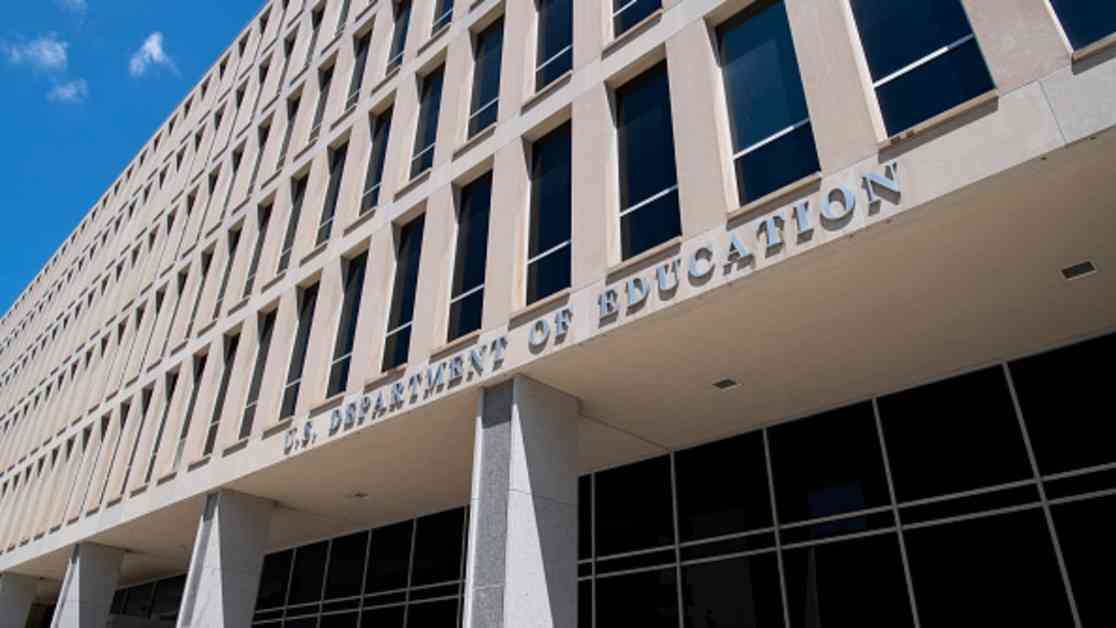**Legal battle over Biden’s student loan forgiveness plan in Republican states**
In a controversial move that has drawn the ire of seven Republican-led states, the U.S. Department of Education is facing a legal challenge to its sweeping new student loan forgiveness plan. Alabama, Arkansas, Florida, Georgia, Missouri, North Dakota, and Ohio have banded together to sue the Education Department, alleging that the Biden administration is unlawfully attempting to forgive hundreds of billions of dollars in federal education debt.
The lawsuit, filed by the states, accuses the Education Department of overstepping its authority by instructing loan servicers to begin canceling eligible loans as early as September 3rd, before the final rule on debt relief is expected to be published in October. The states claim to have “just uncovered documents” suggesting that the department could act sooner than anticipated, raising concerns about the transparency and legality of the process.
A spokesperson for the Education Department declined to comment on the pending litigation but reaffirmed the department’s commitment to advocating for borrowers struggling to repay their federal student loans. The lawsuit is the latest in a series of attempts by Republicans to thwart President Joe Biden’s efforts to reduce or eliminate student loan balances for millions of Americans, a move that experts predict could have significant implications for the upcoming election.
The Biden administration’s revised student loan forgiveness plan comes on the heels of a Supreme Court ruling that blocked its initial policy in June 2023. The new relief plan targets four specific groups of borrowers, including those who owe more than their original loan amount and graduates of low-value programs, with an estimated 25 million people set to benefit from the proposed changes.
**Challenges and Controversies Surrounding Student Loan Forgiveness**
The legal battle over Biden’s student loan forgiveness plan in Republican states highlights the ongoing challenges and controversies surrounding the issue of student debt in the United States. With student loan debt reaching unprecedented levels and burdening millions of Americans, the debate over how to address this crisis has become increasingly polarized along partisan lines.
On one hand, proponents of student loan forgiveness argue that it is a necessary and compassionate response to the financial hardships faced by borrowers who are struggling to make ends meet. They point to the economic benefits of reducing or eliminating student debt, such as increased consumer spending, higher homeownership rates, and greater overall financial stability for individuals and families.
On the other hand, critics of student loan forgiveness raise concerns about the potential costs and unintended consequences of such a policy. They argue that forgiving student debt could create moral hazard by incentivizing future borrowers to take on more debt than they can afford, leading to a cycle of debt forgiveness that ultimately undermines personal responsibility and fiscal discipline.
**The Impact of Student Loan Forgiveness on Borrowers and the Economy**
The debate over student loan forgiveness goes beyond partisan politics and legal battles—it has real-world implications for millions of borrowers and the broader economy. For many Americans, student loan debt is a significant obstacle to achieving financial security and pursuing their goals and dreams.
By providing relief to borrowers who are struggling to repay their loans, student loan forgiveness has the potential to improve individual financial well-being, reduce income inequality, and stimulate economic growth. Studies have shown that reducing student debt can lead to increased spending on goods and services, higher rates of homeownership, and greater participation in the workforce.
At the same time, critics of student loan forgiveness raise concerns about the fairness and sustainability of such a policy. They argue that forgiving student debt could disproportionately benefit higher-income borrowers who have the means to repay their loans, while leaving lower-income borrowers with the same financial burdens they faced before.
**The Future of Student Loan Forgiveness in the United States**
As the legal battle over Biden’s student loan forgiveness plan continues to unfold in Republican-led states, the future of student debt relief in the United States remains uncertain. While the Biden administration has made student loan forgiveness a priority, the outcome of the legal challenge and the broader debate over the issue will ultimately determine the fate of millions of borrowers who are seeking relief from the burden of student debt.
In the coming months and years, policymakers, advocates, and borrowers alike will continue to grapple with the complexities and challenges of student loan forgiveness, weighing the economic benefits and moral considerations of providing relief to those who are struggling to repay their loans. The outcome of these debates will shape the future of student debt in the United States and have far-reaching implications for individuals, families, and the economy as a whole.














